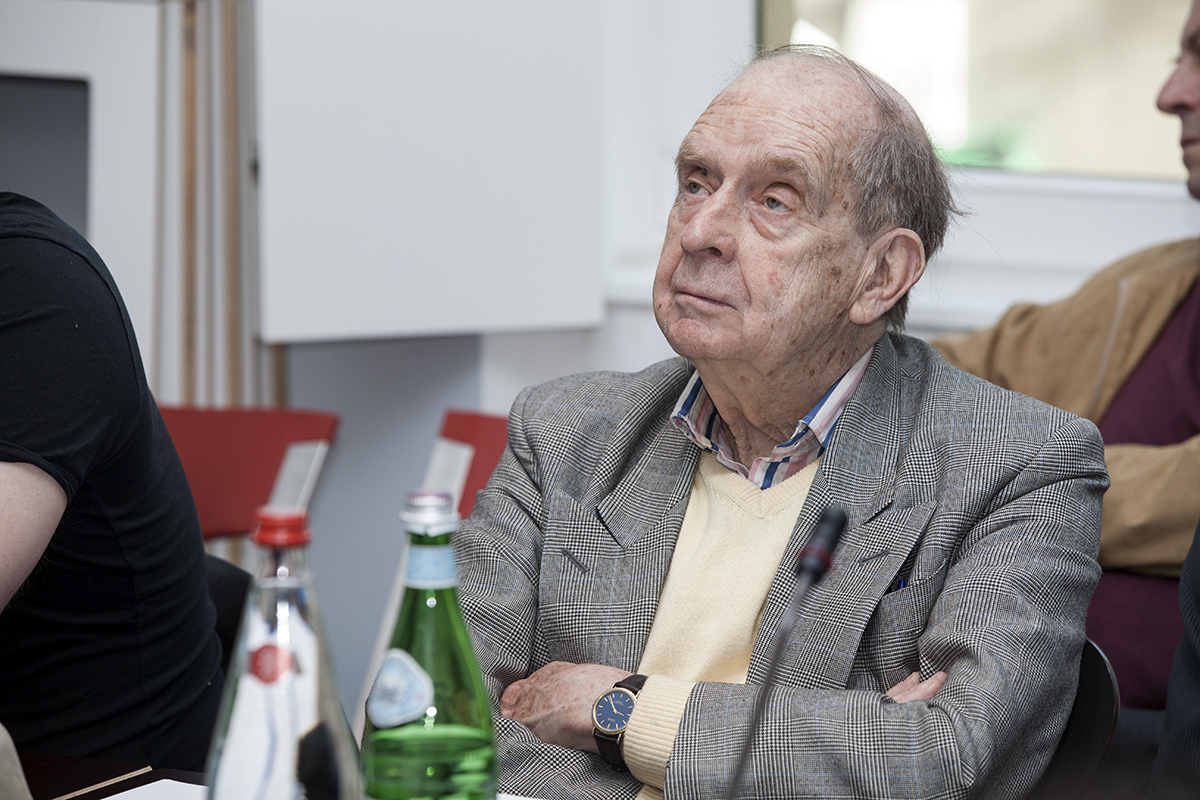1 August 2024
Sir Larry Siedentop
‘Democracy in Europe’
By Neil Tidmarsh

The historian and political philosopher Larry Siedentop passed away last month, aged 88. Born in the USA, he became a politics don at Oxford in the 1970s but was plucked from the obscurity of academia when his book ‘Democracy in Europe’ was published in the year 2000.
The book argued that the creators of the EU had neglected the issue of democracy and political freedom by prioritising economics, indulging in elite plots and being side-tracked by crisis-management. He called for an urgent debate about the EU’s constitutional foundations generally and about its democratic deficit in particular. His book prophetically warned against the dangers of ‘bureaucratic despotism’, of a ‘government of strangers’ triggering ‘fear, sycophancy and resentment’ among the governed.
But he was no Eurosceptic. He was a passionate Francophile (though critical of contemporary French politics), spoke French fluently and had a home in France where he spent most summers. His ideal was ‘a free people governing itself’ (‘what you see in America, and what you don’t see in Europe’), though he admitted that ‘I’m not sure how to get there from here, but I know we’ve got to start’. He suspected that moving towards some kind of de-centralised federalisation, as in the USA and Germany, might be the best way to achieve a system based on popular consent.
The book became hugely influential. It was widely read by Europe’s political elite. It triggered the debate which its author had urged. He became an intellectual celebrity. He was granted an audience with the Pope. He was invited to appear before the European parliament.
But that was 24 years ago. Nearly a quarter of a century has passed since then. And in all that time, what has the EU done to address the democratic deficit which Larry Siedentop identified? What did his book (and the debate which it triggered) change?
Nothing. Not a thing. As last week’s events in Brussels clearly proved.
Last week, Ursula von der Leyen was appointed President of the European Commission, the EU’s most powerful position, for a second five-year term. She won the election in the European Parliament, 720 votes against 401. But who was running against her? Who was the unlucky loser, the Sunak / le Pen of Brussels? No one. She was the only candidate. She had a clear run. (Well, you’re guaranteed a gold medal if no one else is allowed to race against you, but it’s hardly sporting, is it?) The European Parliament was simply rubber-stamping the European Council’s candidate, the candidate chosen by the member states’ leaders.
And how does the Council select its candidate? No one really knows. Not even every member of the Council knows. Italy’s Georgia Meloni complained that Ursula von der Leyen’s selection had been a stitch-up by France and Germany behind closed doors, that Macron and Schultz had made sure all the other leaders were excluded from the process.
More to the point, no one really knows how the President of the European Commission should to be appointed. The EU treaties simply state that the EU leaders choose the European Commission’s president “taking into account the elections to the European parliament” but the parliament must give its consent. This staggering vagueness – in a body which prides itself on being rules-based – means that the whole business is usually an undignified tussle between the EU parliament and the EU Council of Leaders and leaves Brussels looking undemocratic and lacking in transparency every time.
The parliament won that tussle ten years ago when Jean-Claude Juncker was appointment as President of the Commission. The parliament’s “spitzenkandidat” system insists that the candidate is nominated by the the biggest pan-European political group in the parliament; the nomination is then confirmed by the Council; and finally the candidate is voted into place by the parliament. Hence the appointment of Mr Juncker, an otherwise unpopular candidate; once nominated by the largest block of MEPs, his appointment was rubber-stamped by the Council of Leaders. The protests of David Cameron and one other leader were ignored – the other members of the Council were unwilling to risk a constitutional crisis by challenging the parliament’s candidate.
Five years later, the EU Leaders were determined to side-step the “spitzenkandidat” system. They wanted to take the initiative away from the parliament because they were afraid that that year’s parliamentary elections might make the far-Right the biggest parliamentary group (and perhaps because they didn’t want another president like Mr Juncker foisted on them). They pre-empted parliament by announcing their own candidate for the presidency of the Commission; Ursula von der Leyen, who was then the German defence minister.
The press reported that the leaders reached a consensus only after “four ill-tempered summits, including a tortuous all night session”, that Mrs Merkel abstained and that she and Mr Macron failed to push their preferred candidate through. But apart from that the citizens of Europe were in the dark. The Council of Leaders’ choice of candidate was then accepted by a quiescent EU parliament unwilling to risk a constitutional crisis by challenging it. This behind-closed-doors selection and rubber-stamped appointment drew comparisons with President Xi’s ‘election’ by the Chinese Communist Party in their National Convention which happened at the same time.
And here we are, five years later, and the same thing has happened again. And in five year’s time – when the next unelected President of the unelected Commissioners is due to be appointed – there’s little doubt that the EU will still be blighted by this deficit of democracy and absence of transparency.
Larry Siedentop followed ‘Democracy in Europe’ with another book, ‘Inventing the Individual; the Origin of Western Liberalism’ in 2014. Here he argued that the concept of the individual was unique to Europe and provided “the proper basis for our legal and political systems… the bedrock of personal identity and social order in the West”. He suggested that the roots of this concept, and the rights and freedoms and social duties it engendered, lay not in Europe’s Classical past, not in its Greco-Roman heritage, but in Christianity, in the religion which teaches that all men are equal in the eyes of God; God cares for each and every one of us individually and equally and has given us free will and a conscience, so we should respect each other as individuals and treat each other justly. Siedentop claimed that it was this evolution of faith in the Middle Ages in Europe, rather than the neo-Classical and essentially secular ideas of the Renaissance and the Enlightenment, which gave us modern Liberalism’s ideas of individual freedoms, rights and duties.
Significantly, Siedentop could trace his theory back to his childhood where he was raised in the Calvinist church of his Dutch-German grandmother, with its premium on the individual’s conscience. But it’s worth pointing out here that the Calvinistic faith of Siedentop’s ancestors was once condemned as heretical by the European religious establishment. Calvinists were persecuted as heretics. The teachings of Christianity may well encourage the idea of equal rights and individual freedoms, but for the last two thousand years the religious authorities in Europe have ruthlessly repressed the idea whenever it challenged their own powers. There is indeed something about this religion that encourages such ideas and eventually manages to absorb them in the long run – but more often than not their original advocates were initially condemned as heretics and persecuted, excommunicated, imprisoned or executed.
Many of the ‘heretical’ churchmen who first advocated the idea of individual rights and freedoms were British (hardly surprising, perhaps, as Europe’s central authority – whether Emperor or Pope – would find it harder to exercise its power on a distant and peripheral island than on the Continent itself): Pelagius (excommunicated and banished from Rome in 418AD); Roger Bacon (condemned by the Franciscans and imprisoned in 1277); John Wycliffe (condemned as a heretic by the Council of Constance and posthumously burned at the stake in 1414); William Tyndale (accused of heresy and arrested, imprisoned and executed in Antwerp in 1536). Etc, etc. The barons who drew up the Magna Carta in 1215 were threatened with excommunication. And if the Reformation hadn’t happened a hundred years before the soldiers of the New Model Army invented modern parliamentary democracy from scratch during their debates in the church at Putney in 1647, with only the English language Bible to guide them, then no doubt they too would have been excommunicated. And the fight against slavery was driven by British dissenters and non-conformists – by Methodists and Quakers – and not by the mainstream religious establishment anywhere.
Perhaps this ‘heretical’ and stubborn insistence on democratic rights and individual freedoms – and on change to accommodate them – explains why Britain was never a very comfortable member of the EU.


